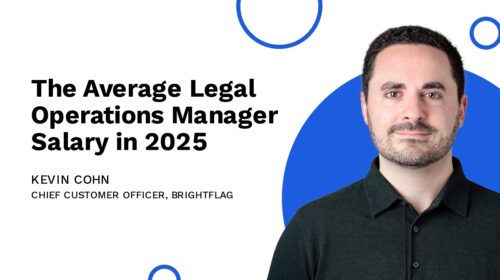What Is Legal Operations in 2025?
Legal operations, or legal ops, refers to the team member(s) who manage the business and administrative aspects of an in-house legal department. Essentially, a legal operations manager handles everything but the actual practice of law, including:
- Outside counsel management
- Legal technology
- Budgeting
- Business process improvement
- Project management
Ultimately, legal operations exists to make the delivery of legal advice to the business more efficient and impactful. This is critically important work—but while the field has experienced significant growth in recent years, there is still a lot of progress to be made when it comes to advocating for the legal operations function to CLOs and GCs.
With this in mind, let’s explore the key responsibilities associated with legal operations in order to better understand the function and the sizable business impacts it can have in 2025.
What are the Responsibilities of Legal Operations in 2025?
When the legal ops field emerged around fifteen years ago, it was primarily focused on process improvement and technology deployment. While those aspects of legal operations are still important, today legal ops plays a broader, more strategic role.
Here are the core competencies legal operations professionals typically focus on to help their in-house team support the business’ larger goals—complete with expert tips for legal ops leaders looking to successfully navigate these responsibilities in 2025.
Budgeting
While budgeting has always been important for in-house teams, it’s critical in 2025 as legal departments face the double challenge of increasing workloads and intense budget scrutiny. The ACC recently reported in its 2024 Chief Legal Officers (CLO) survey that 42% of CLOs had to reduce costs last year. Meanwhile, 58% of in-house teams dealt with increased law firm rates in 2024—further constraining their already limited resources.
Budgeting is an area where the legal operations function can really shine by finding ways to maximize their in-house team’s limited resources.
Legal Ops Tip: Utilize a Tool to Get Full Visibility into Spend
A great place for legal ops to start when it comes to managing the budget is learning how to track legal spend data and analyze it to identify cost savings opportunities.
Of course, these financial management tasks are easier said than done—especially considering the unpredictable expenses associated with legal work. Thankfully, there are tools that can help legal ops professionals consider all relevant budgeting factors and accurately predict spend.
Brightflag, for example, offers a budgeting tool that:
- Interprets historical data, such as past invoices
- Visualizes the overall budget and budget sub-categories in dashboards
- Uses AI to form accurate predictions
- Updates spend vs. budget data in real time
- Alerts users when invoices go over budget
With these features, legal ops can navigate unpredictable events and set a reasonable, informed budget that accounts for all relevant factors.
Technology Integration
Legal ops professionals are often tasked with evaluating, implementing, and optimizing technology solutions for their in-house teams.
Picking a tool is just the first part of this process. Legal ops must also facilitate the implementation of the technology by helping in-house team members learn how to use the platform, and continuously monitoring their legal tech stack to ensure tools are being used and making a meaningful impact.
Legal Ops Tip: Thoroughly Research Tools and Match Them to Pain Points
The rapid advancement of AI and machine learning tools in the legal sector has made technology integrations more difficult than ever. Every vendor these days—both within the legal tech space and beyond—is touting their AI capabilities. Unfortunately, some of these AI features lack real substance.
To navigate this crowded and often confusing market, legal ops should put in the work to research and select legal tech that truly adds value to their law department. That means assessing technology needs by determining what the in-house team’s pain points are, and matching those pain points to the available technology solutions.
Once that match has been made, legal operations can further evaluate potential tools by requesting pricing and feature information from vendors—as well as case studies, testimonials, and reviews from similar companies that use the tool. This data can be presented to the General Counsel and finance team to help select cost-effective, reliable solutions that they can confidently say will be utilized by the legal team.

Internal Stakeholder Management
Legal ops serves as a bridge between the legal department and other business units. That means they communicate with other departments—like finance, HR, and IT—to explain why legal initiatives are important for the business, and make sure legal’s considerations are factored into company plans.
Legal Ops Tip: Build Trust with a Listening Tour, Then Establish Expectations and Take Action
Legal ops can establish strong, stable relationships with their most important internal stakeholders by meeting with them one-on-one. These meetings can be used to better understand stakeholders’ main objectives in their position, the legal KPIs they care about most, and to get to know them better on a personal level.
Additionally, legal operations can leverage the shared respect and trust built up during these meetings to set clear expectations about what they can—and cannot—provide to internal stakeholders. This helps proactively prevent requests from other departments for work that does not fall under legal operations’ remit.
Once legal ops knows which legal data their stakeholders care about, and have set clear expectations on what they can deliver, legal operations can build a reliable workflow for tracking and sharing relevant metrics with stakeholders. Tools like Brightflag can make this process easier by automatically reporting on legal data analytics in real-time.
External Stakeholder Management
In addition to managing internal stakeholder partnerships, legal ops professionals help manage relationships with outside counsel and legal service providers. External stakeholder management has a much different focus though, oftentimes centering around tasks like:
- Evaluating potential firms and service providers
- Negotiating fee arrangements
- Tracking performance metrics for outside counsel and service providers
Legal Ops Tip: Enter Conversations Equipped with Data
Data is the fuel that powers legal operations, and that’s particularly true when it comes to the task of managing external vendors. After all, legal ops can’t identify a more cost-effective resourcing mix or effectively negotiate timekeeper rates if they don’t have an established point of reference to work from.
A comprehensive e-billing and matter management solution like Brightflag can help by consolidating all the pertinent data that legal ops needs to strategically manage vendor relationships. Using the platform, legal ops can access and track outside counsel spend, compare law firms to find the most cost-effective partners, and more.
For a more in-depth look at external stakeholder management, check out our Legal Ops 101 Video on Vendor Assessment.

Reporting
As we’ve just established, data is a key component of an effective legal operations function. However, simply collecting relevant data is not enough; that data has to be thoughtfully analyzed and reported on by legal ops for it to have any actionable value.
When done well, reporting helps legal teams better predict trends in their legal spend and make proactive decisions to better control costs.
Legal Ops Tip: Leverage Templates and Automation
Running reports can be tedious and painstaking. But it doesn’t have to be.
To make the process easier, legal ops can leverage reporting tools that come with built-in report templates. This cuts down on the time spent customizing fields and filters every time a report is run.
Taking things a step further, a platform like Brightflag can be used to completely automate the reporting process. Say, for example, the General Counsel wants a monthly report on the top 10 matters by spend. With Brightflag, that report can be scheduled to run on a monthly cadence and automatically be sent over to legal ops—no manual work required.
What is a Legal Operations Specialist’s Job Description in 2025?
The impact legal operations can have in modernizing and improving the efficiency of the in-house legal team is clear. But it’s not always fully clear what roles and responsibilities should fall to legal ops, and which are better performed by other in-house team members.
To help clarify the responsibilities of legal ops, here’s an example of what an ideal legal operations specialist job description might look like:
We’re seeking a strategic and innovative legal operations professional to drive efficiency, technology adoption, and business alignment within our legal department. The ideal candidate will:
- Develop and implement data-driven strategies to optimize legal department performance
- Lead the evaluation, selection, and integration of advanced legal technologies
- Manage departmental finances, including: Budgeting, forecasting, and spend optimization
- Oversee vendor relationships and outside counsel management to maximize value
- Drive process improvement initiatives
- Facilitate cross-functional collaboration to align legal operations with broader business goals
Key qualifications:
- Strong analytical skills
- Ability to translate complex data into actionable insights
- Experience with legal tech platforms, project management, and change management
- Excellent communication skills
- Ability to influence stakeholders at all levels
This role is crucial for success in optimizing our legal department’s performance and aligning it with our organization’s strategic objectives.
Embrace Your Strategic Side to Move Ahead in Your Role
As legal operations continues to evolve, one thing is clear: the future of the field lies in strategic leadership. Legal ops professionals are moving beyond support roles to become key drivers of value and innovation within their organizations.
To thrive in this new landscape, legal ops professionals must blend legal knowledge, business acumen, and technological savvy. By considering these three factors, they can place themselves in the unique position of being able to align their legal strategy with broader business objectives while empowering their in-house team to work efficiently.
Interested to learn more about how Brightflag helps provides legal operations—and the rest of the in-house legal team—with everything they need to take their work to the next level? Contact us today to book a demo.



